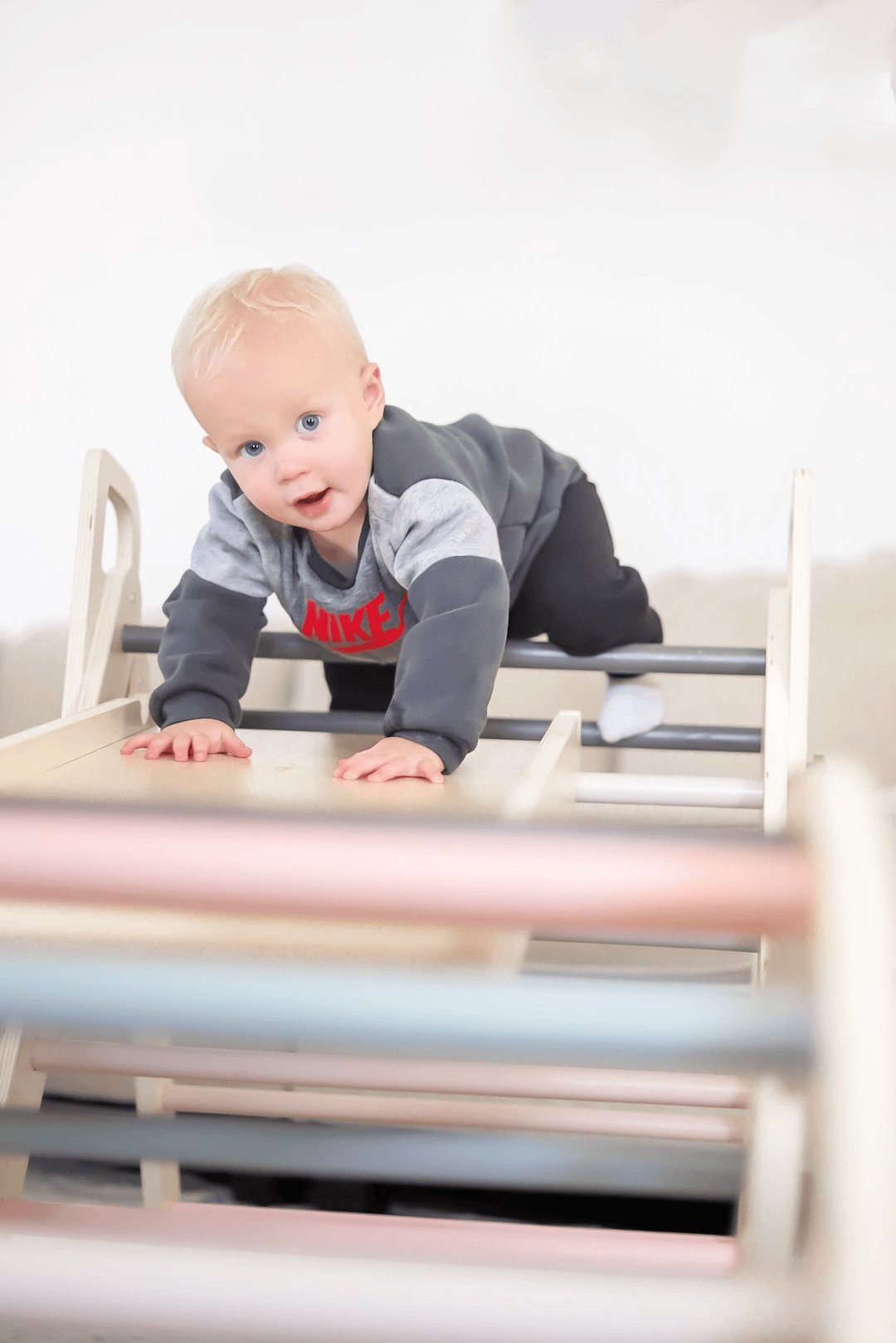1 comment
May 23, 2024
What is Montessori Education and Why Wooden Toys?
Written by Rachel.W
Montessori Education and Wooden Toys: Fostering Child Development
Introduction Montessori education, an educational philosophy for children from birth to adolescence, goes beyond traditional methods. It emphasizes hands-on learning and exploration in a specially prepared environment designed to nurture a child's natural curiosity and desire to learn. Wooden toys, with their natural aesthetic and open-ended nature, align perfectly with Montessori principles, offering children opportunities to develop their cognitive, physical, and social skills.
What is Montessori Education?
Developed by Dr. Maria Montessori in the early 1900s, Montessori education is child-centered, meaning the child takes the lead in their learning journey. Here are some core principles that define Montessori education:

- Respect for the Child: Montessori education views children as competent individuals with an innate potential to learn and grow.
- The Power of Observation: Teachers act as facilitators, carefully observing children's interests and developmental stages to provide the most appropriate guidance and support.
- The Prepared Environment: The Montessori classroom is a meticulously designed space with a variety of age-appropriate materials and activities. This environment encourages exploration, independence, and order.
- Self-Directed Learning: Children are given the freedom to choose their learning activities from a range of options presented by the teacher. This fosters a sense of ownership and engagement in their learning.
- Intrinsic Motivation: The focus is on the joy of discovery and the satisfaction of mastering new skills, rather than external rewards or punishments.
Montessori Stages of Development
Montessori education recognizes that children develop at different paces and have distinct needs at various stages. The curriculum is divided into four following stages:
- 0-3 years (The Infant Stage): This is a crucial period for sensory development. Montessori classrooms for this age group provide ample opportunities for exploration through safe, natural materials that stimulate the senses of touch, taste, smell, sight, and sound.
- 3-6 years (The Toddler Stage): Language, cognitive, and social skills blossom rapidly during this stage. Montessori classrooms offer practical activities that encourage children to interact with each other, develop vocabulary, and refine their fine motor skills.
- 6-9 years (The Elementary Stage): This stage focuses on refining basic academic skills like reading, writing, and math alongside the development of more complex cognitive abilities like problem-solving and critical thinking. Montessori materials at this stage become more sophisticated, providing opportunities for independent exploration of various academic subjects.
- 9-12 years (The Middle School Stage): This stage is marked by the development of self-awareness, independence, and a sense of social responsibility. Montessori curriculum encourages children to delve deeper into various subjects, fostering a love for learning and preparing them for adolescence.
The Benefits of Montessori Education
Research has shown that Montessori education offers a multitude of benefits, including:

- Enhanced Academic Achievement: Studies indicate that children who receive a Montessori education often perform well academically.
- Increased Independence and Confidence: The emphasis on self-directed learning empowers children to become independent thinkers and develop strong self-esteem.
- Nurtured Creativity and Imagination: Open-ended play and exploration are central to Montessori education, fostering a child's creative spirit and problem-solving abilities.
- Developed Social Skills: The collaborative nature of Montessori classrooms allows children to learn how to work together, communicate effectively, and develop empathy for others.
Why Wooden Toys?
Wooden toys stand out as excellent Montessori-compatible learning tools for several reasons:
Natural Material: Wood is a natural material that appeals to children's senses. Its smooth texture, inviting warmth, and earthy aroma provide a calming and engaging sensory experience.
Durability: Wooden toys are renowned for their durability, withstanding vigorous play and lasting for years. This longevity makes them a sustainable and eco-friendly choice.
Open-Ended Play: Wooden toys encourage open-ended play, fostering creativity and imagination. Unlike toys with prescribed functions, wooden blocks, puzzles, and stacking toys allow children to explore and discover without limitations.

Montessori and Wooden Toys: A Synergistic Approach
Montessori education and wooden toys share a common goal: to empower children's holistic development. When combined, they create a powerful learning environment that nurtures curiosity, independence, and a love for learning.
Fine Motor Skills: Wooden toys like threading beads, puzzles, and construction blocks help refine fine motor skills, essential for writing, grasping, and manipulating objects.
Cognitive Development: Sorting, stacking, and matching wooden toys promote cognitive development, including problem-solving, classification, and spatial reasoning.
Sensory Exploration: The tactile nature of wooden toys engages children's senses, fostering sensory exploration and awareness.
Language Development: Wooden toys provide opportunities for language development as children narrate their play, describe objects, and engage in imaginative conversations.
Conclusion
By incorporating wooden toys into Montessori-aligned activities, parents and educators can create a stimulating environment that caters to a child's natural desire to learn and explore. Wooden toys, combined with the core principles of Montessori education, empower children to develop a love for learning that will stay with them throughout their lives.
As Maria Montessori aptly stated, "The hands are the instruments of the mind." Wooden toys provide the perfect tools for young minds to explore and create, laying the foundation for a lifetime of discovery.


Comments (1 comment)
Peggy
I bought the 2 piece set and now I want to add the climbing arch. Is it possible to buy it separately?
Leave a comment